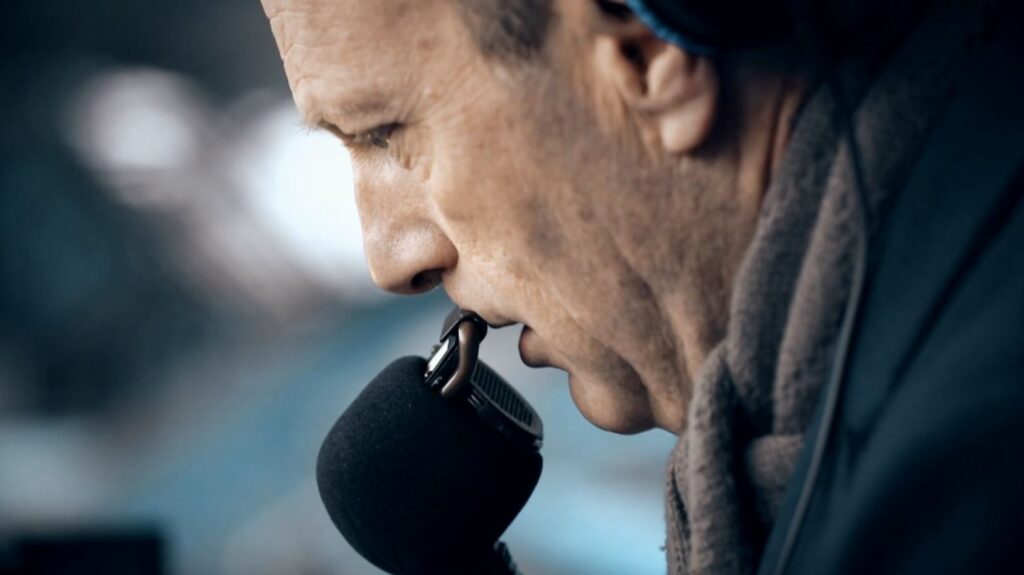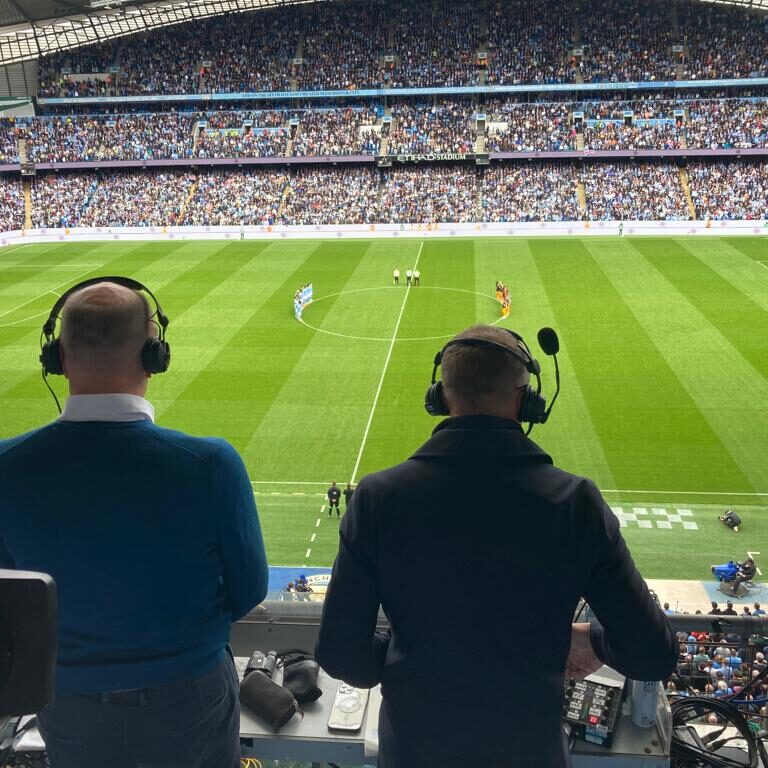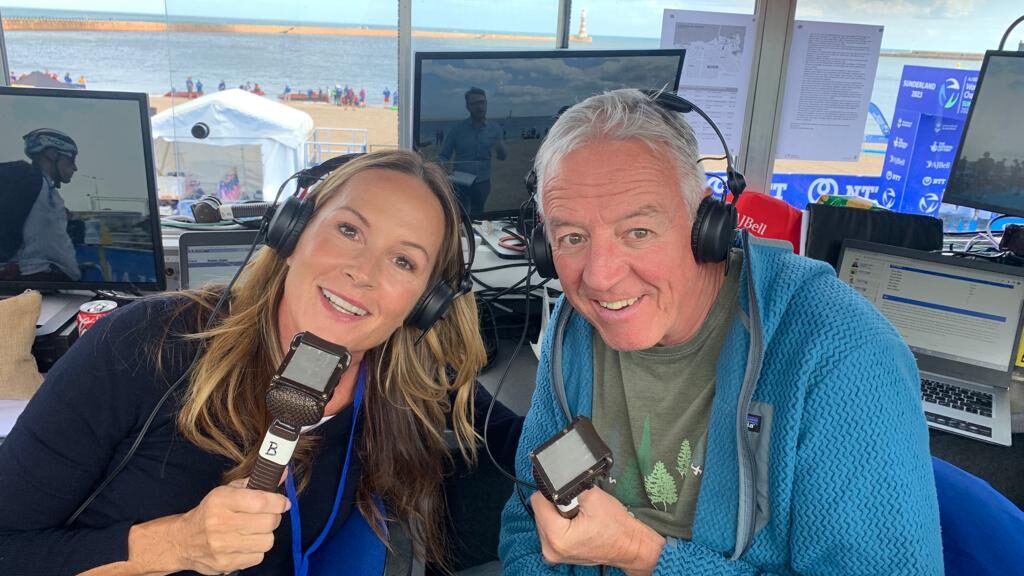Iconic sporting moments don’t just live in our memories because of what we see – they’re shaped by the voices we hear. Sidelines delves into the lives of three TV commentators who reveal how commentary brings the sporting experience to life.

Peter Drury
Peter Drury, 57, has been a football commentator for over three decades. He has worked for BBC Radio Leeds, ITV, BT Sport, Amazon Prime Video, and is now the lead Premier league commentator for Sky Sports and NBC Sports.
People say a commentator is the soundtrack of the game.
That is so wrong. The soundtrack of the game is the supporters.
A commentator rides on the noise of the crowd, using it as an indicator of mood. Without it, you feel like a boat drifting hopelessly in a lake without a tide to ride on.
The crowd is essential. Nothing a commentator says matches what the crowd does.
My journey into commentary was one of good fortune. I was as fascinated by how football was broadcasted as I was by the sport itself. I never imagined that I was going to make a living out of it after starting off as a trainee accountant.
The job is very controlled and requires high concentration. It’s much more about head than heart, but the heart must come into it.
One occasion where the heart had an impact was in the opening 2010 World Cup match between South Africa and Mexico and my now famous line:
“TSHABALALAAAAA! GOAL BAFANA BAFANA! GOAL FOR SOUTH AFRICA! GOAL FOR ALL AFRICA! JABULILE! REJOICE!”
I’m delighted to say that that was an outpour offering of genuine mood. The truth is it was a very special day.
Prior to the game, I bumped into a South African commentator and asked: When you’re cheering a goal, what word you would use? He replied, ‘jabulile’, meaning rejoice, and I noted it down.
We all know the history of South Africa. The goal meant so much to it. It was very moving to walk up to that stadium and see people of all ages and races mutually embraced, to see the value of sport and what it can do for society and the world.
Then there was this beautiful moment where a little boy from Soweto scored their first goal in their World Cup, and it was meant to be.
The best commentary moments are those which you feel and cannot have anticipated and dive into emotionally. And that was certainly one of my very best. I’m not congratulating myself on my commentary, I was very blessed to be involved in it.
I enjoy the drama of a football match and the narratives involved. There’s nothing that matches a last-minute winner, or when an underdog wins. Those moments don’t happen a lot, which is what makes them so special.
Those are the great challenges – when there’s an unexpected moment; when you earn your call; when something remarkable uncovers and that’s when the adrenaline kicks in and when you have to hope that your instincts do the right thing.
As a commentator, you are, above all, a storyteller. And there’s no storytelling without a story.


Matt Chilton
Matt Chilton, 61, has been a sports commentator for over 30 years, covering 13 Olympic Games. A Ski Sunday contributor, he’s worked with Eurosport since 1992 and BBC Sport since the mid-90s, including Wimbledon Championships coverage since 2001.
One of my most memorable ‘calls’ was Alex Yee’s triathlon gold medal. It seemed his race was run, but in my job – and particularly in the Olympics – you never write anybody off, especially someone as tenacious as Alex.
I did doubt he could close the gap to Hayden Wilde. The TV coverage didn’t help – limited shots of Yee meant I had to react on instinct.

But, when it became clear he might do it, I stood up – got oxygen into my lungs and delivered a loud commentary finish:
“HE WAS KIDDING US ALL ALONG! HE KNEW WHAT HE WAS DOING ALL ALONG AND HE HAS BROKEN WILDE!”
I feel pressure to do a good job and deliver lines that will stand the test of time. Those words were played back during Sports Personality of the Year.
Watching them, I thought, okay, those lines worked – they matched the moment’s significance.
But, not every moment can be improvised. Ahead of the British women’s hockey team’s 2016 Olympic final, I prepared for multiple scenarios.
When Hollie Webb scored the decisive penalty, I had lines ready. But even then, I fluffed it, saying, “The history makers” twice before saying, “The hockey history makers.” It turned out better than I’d planned and those words were actually used for a book title.
Strangely, a coin flip started my commentary career.
In the late 80s a friend and I were organising an event in the Alps. The night before, we realised we needed a commentator. After a coin flip, I found myself holding the mic and it went from there.
Commentating a race is different from a tennis match. Tennis is unpredictable. A match starting at 1pm could end by 2.30 or stretch into the evening. You speak less, but there’s no less concentration.
Races, however, have a clear build-up and climax – you save your loudest, most passionate delivery for the final moments. As I was told early in my career: “Don’t go too early, or you’ll have nowhere else to go!”
As commentators, we’re privileged to be so close and personal with the sport. You’d be in the wrong job if you didn’t get emotionally involved.
Passion comes from following it through from its inception to conclusion – getting to know the characters, officials, storylines and scandals.
With TV commentary, you’re embellishing the pictures the audience already sees. You’ve just got to add to it.
There’s nothing worse than an anti-climax, but in sports commentary, in particular, you want that nail-biter; that last goal of the penalty shootout; the drama of Alex Yee overtaking.
Those moments are what brings the audience in because when it’s thrilling, it’s unforgettable and eminently watchable.

Nicole Brown
Nicole Brown, 34, has been an equestrian commentator for over a decade. She has worked with the BBC, Sky, and Event Rider Masters.
There’s a real adrenaline rush in live sport commentating.
Riders will say that being counted down in a cross-country start box is their adrenaline rush – hearts are madly racing, and mouths are bone-dry.
But, for me, it’s the countdown to a live broadcast – that’s my start box.
Growing up, I used to ride a lot and I was terrified of public speaking. I could not think of anything worse.
I had to sell my horse when I was going to university, but always wanted to stay involved in the sport; so, I got into commentary.
I started by making on-site announcements over a PA system. The fear of public speaking soon went away and I really got the bug for telling the story; it was love at first sight.
With equestrian sports, commentators have the added challenge of having half a ton of animals to contend with as well. They have their own brains and minds. It adds a completely different dimension to an individual sport.
My role is to draw the audience in and make them feel part of it – so they can also live in the sporting experience. I get the most pleasure from sharing the story, excitement and the special and unique bond horses and riders have.
Equestrian events are a very technical sport to commentate. You’ve got to do your research and be very quick under pressure. There’s a real art to not dropping yourself in hot water if you do not know the answer.
Naturally, you become quite emotionally involved in it. The same is true for an athlete’s job: to go and deliver on the field of play. They will feel a whole kaleidoscope of different emotions – ultimately, they can’t break down at that moment in time.
The same can be said for a commentator. The bigger the pressure, the more we should rise to the occasion.
The first time I did the Burghley Horse Trials for the BBC was career-defining. It was alongside Mike Tucker, who had been the voice of equestrian sport for many years. That was a real ‘pinch-me’ moment.
Being a commentator in a male-dominated industry has had its challenges. I certainly have been overlooked plenty of times because I’m a woman, which is a horrible thing to say in today’s world, but it’s the truth. I am not one to back down from a challenge. I want to prove people wrong, which has made any success even sweeter because it’s been hard-fought.
We can tell such a story with our voices that I think it’s a tool that we can’t use enough. Ultimately, that is what people hear. So, let’s make sure that they enjoy listening to it.



